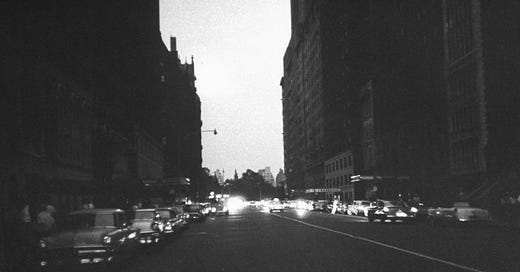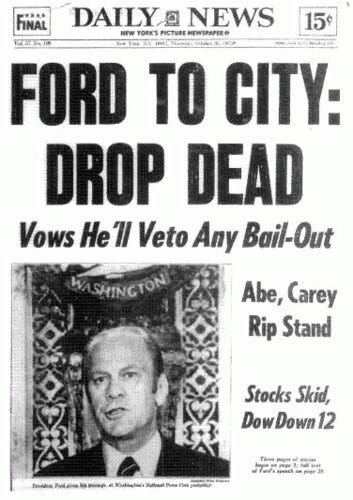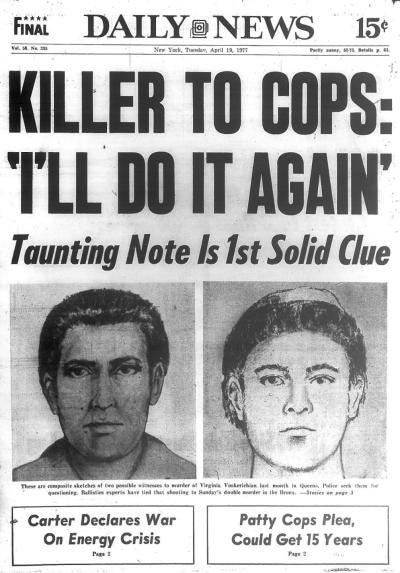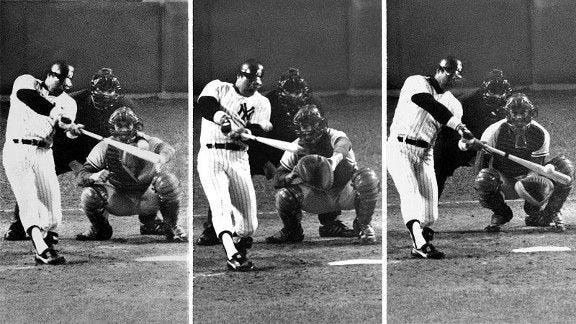Of all the years of my life,1977 is the year I could tell you the most about. It was a time so packed with intensity and emotion and drama; I don’t recall any other year of my life being quite like that one. Of course, I was barely 15 at the time and there’s enough emotion and insanity inherent in that alone to make the year worth telling about. But there was something so different about 1977, especially the late spring and summer. Especially in New York.
I was in the midst of my first year in the local Catholic high school. I had a new set of friends, a new way of life, a new outlook on the world. I would be 15 in a few months. Life was good. Life was mine.
Though we lived on Long Island, we weren’t that far removed from the glamour and excitement of New York City. Even at our young ages (and I doubt there is a Long Island parent today that would be as permissive as our parents were back then) we would sometimes take the train to the city on weekends and just walk around, using our allowance money to buy records and eat burgers at the Steak and Brew, where we tried to pass ourselves off as 18 year olds to get the free pitchers of beer that came with the burgers. No matter how good it was to be 14 or 15, it seemed there was always something better on the horizon. We wanted to be 18 or 19. We wanted to cruise around in cars and go to bars. We were jealous of the permissive lifestyle that was so prevalent in NY at the time — Studio 54 opened in 1977, punk rock was on the rise and bands like The Dead Boys were playing at CBGB’s — it seemed there was so much turmoil, yet so much excitement. It was all so glamorous in a decadent way and we couldn’t help but want to be caught up in it.
New York City was just coming out of terrible times — there had been a huge financial crisis and there was a stretch when the South Bronx was literally on fire for the longest time. My father was a fireman back then and he was always talking about how there would be no fires left to fight in the area eventually because it was all going to burn down. Bushwick, where my father worked, was no better. It was a constant battle to stop the fires and to stop the emotional fire that was spreading throughout the area. As the heat rose, tempers rose. There was a general feeling of unrest that made my father dread going to work. It wasn’t just the flames; it was the feeling that there was something else about to explode besides empty tenements. My parents discussed all this at the dinner table with us, and as we watched the nightly news together, we watched New York City almost die before our eyes.
So there we were in 1977 and the city was alive, much in the way Frankenstein’s monster was alive. There was so much happening, and we would sit on our suburban porches and be wistful about it. While we may have been able to get to the city on a weekend day, there was no way we would be able to take part in the nightlife that was going on there. Not at 14. As much as some of us wanted to stick safety pins in our faces and slam dance at CBGB’s or some of us wanted to wear glittery dresses and platform shoes and dance the night away, it wasn’t going to happen. And we knew that by the time we were old enough to enjoy this stuff, it would all be gone and there would be new scenes, so we lived vicariously through newspaper accounts and tales from older friends.
And then David Berkowitz came along and the aura of NYC seemed to dive headlong into darkness.
When parents realized there was a serial killer on the loose, life outside of school and home shut down. It didn’t matter that it seemed this killer only wanted young brunette women in the Bronx and Brooklyn and Queens — you know how parents are. Fear spreads as fast as rumors. So doors were shut and curfews were made and this layer of nervousness settled over us that spring and lasted well into summer. People talked about Son of Sam everywhere, in stores and at the pool and in the dentist office, but they talked in whispers, as if saying his name out loud would be to call him into our safe, suburban homes.
I remember one friend’s mother — a holy roller who would make trays of cookies for us and serve them with religious tracts — moaning about how we deserved this, this day and age was so decadent what with it’s disco and punk rock and women dressing provocatively. She was afraid the end times were coming and Son of Sam was just the harbinger of certain death and destruction and God’s wrath upon us.
Which it may very well have seemed to a lot of people that summer. I know I had my share of fear. While the summer of ’77 and all of its intensity and scariness played out on the front page of the Daily News every day, there were other, smaller things going on in my little world that just added to the thickness that was beginning to choke the life out of summer. My friend Lori had taken to visiting her relatives in Queens that summer and she came home with stories that made me wonder if Mrs. Holy Roller wasn’t on to something. Now, I think about all those stories and I know that Lori was exaggerating some and making some up and maybe she liked to see the horrified look on my face. But then, in the midst of New York on the brink, in the middle of this general feeling of an uprising of evil and animosity, I believed it all and it made me feel sick.
Between the oppressive heat and humidity and all that was going on around me, I felt a sick sense of dread that summer, but it was a dread tinged with a curious excitement. There was so much electricity in the air you could almost hear the crackling of static when you woke in the morning. And it was so damn hot, it was the first time that when my mother said this heat could make people crazy, I didn’t hear it as a cliche at all. It apparently was true.
The relentless swelter had gotten to all of us, kids and adults alike; we were short tempered and cranky and prone to starting fights over nothing. We were living on the edge and we all knew it. I think we aged five years that summer, all 14 and 15 but cynical and hardened in a lot of ways, from having so much death and tension and raw energy shoved in our faces every day, from the newspaper headlines to shell-shocked parents hammering us with statistics and warnings.
We were living all this out with a soundtrack, huddled in the abandoned house next to the high school or in the sump or in someone’s garage every night, listening to this bizarre mix of the Ramones and Sex Pistols, Kiss and Foghat, Lynyrd Skynyrd and Queen. We were all revved up with no place to go, just some green grass and white picket fence kids both fearing the world we were living in and wanting so much to be an intrinsic part of all that fear, to be in there, at some punk club or on the quiet streets of Brooklyn, looking for a serial killer. We settled for drinking cheap beer and smoking stolen cigarettes and alternating our disaffected youth rock music with the sounds of baseballs being hit out of Yankee Stadium.
July 13, 1977 found us sitting in front of my house. Nature was offering us a freaky show of heat lightning and we stared at the sky for a while, entertained by nothing more than streaks of electricity bolting through the air. And then a weird thing happened. It was subtle, almost imperceptible from where we were sitting, but I noticed it and so did Lori. The night sky got darker. Something changed. It was about 9pm. By 9:30 or so, news of the New York City blackout had spread and we realized what we witnessed.
I remember my mother, in a state of near-panic, saying “this won’t be like 1965,” and it was only later on that I knew what she meant — the blackout of 1965 was calm and peaceful. The blackout of 1977 was anything but, and we could almost anticipate it, sitting in my mother’s kitchen listening to the radio for breaking news. I thought again of my friend’s mother. It was all coming to a head — Son of Sam, disco, punk rock, money woes and murders. Somewhere in Levittown, Mrs. Holy Roller was probably under her kitchen table with some candles and her rosary beads and the bible, waiting for Satan himself to bang down her door.
I was scared. Out there on Long Island, where we had lights and television and safety, I was scared. The news of the riots and looting and mayhem came in and my mother remarked that New York City was a sinking ship, a disaster. My father was at work in Bushwick and that panicked me, it even panicked my friends. This was the climax of everything, of all the turbulence and fear and the explosion we had been waiting for — or predicting — happening.
I thought this would be the end of all it, in a way. I thought of the graphic my English teach had drawn on the blackboard just a few months ago, showing the movement of a story, with the climax as the peak of a mountain and then everything slowly rolling down the hill after that, towards the inevitable resolution. I expected that everything after the blackout would be anti-climactic as the conclusion of this summer drew near. Although it was only mid-July, it was if summer was ending right then and there. I never wanted so badly to get back to school and normalcy and routine. I hated that there was more than another month of this floating feeling left, that time and all the empty space between July and September was pulling us towards something worse, something even darker. Maybe the blackout and the subsequent mess of arrests and broken glass was it. Maybe from here on, we could get back to the business of being kids who don’t think about things like men who stalk and kill. And we tried. We hung out, we listened to records, we watched baseball, we went to the movies and started and ended teenage romances and some of us went to summer school during the day because we didn’t pay attention in 9th grade biology.
On July 31, Son of Sam struck again and broke us out of our complacent reverie. It’s not like we had forgotten about him — he was on the front page nearly every day and we were devouring every word from Jimmy Breslin, who had become this cult figure demigod; an agent to Satan to some who thought Breslin was giving the killer too much publicity, a hero to others who praised Breslin’s caustic, raw writing and his willingness to be a pawn in order to bring this killer into the open where he could be caught.
And finally, Berkowitz was caught. August 10, 1977, with summer almost over, with back to school banners hung in the windows of May’s department store, with all the hot, open days of freedom already taken from us, a killer was moved off the streets and into jail and the sigh of relief everyone breathed nearly cooled the air.
Somehow it fell to the Yankees to salvage 1977 for us. Ron Guidry, Mike Torrez, Sparky Lyle, Mr. October with his five home runs in the series, three in one game. Watching those games against the Dodgers, listening to the sounds of the cheers, New York seemed good again. It seemed whole. And then there was Howard Cosell on ABC during game 2 of the series, as another one of those Bronx fires burned out of control behind the Stadium, pointing out the fires, talking about the Bronx burning. And that seemed to epitomize it right there, to encapsulate everything about that summer.
The Yanks won the series, Ed Koch replaced Abe Beame that November and New York, as always, recovered. But not without leaving its mark on some of us, even 14 year old kids out in suburbia who vicariously lived through the whole sordid summer, but felt every bit as if it belonged to them too.








For any non-Long Islanders reading, the sump she is referring to is a big hole in the ground with a chain link fence around it that the storm water from the storm drains flows into to infiltrate into the sandy soil. From what I could tell it looked like when they were built they locked the gate, threw away the key and never thought of them again. Therefore, they were all overgrown, kids broke in through the fence to explore, and trash tended to accumulate.
The only sump I knew was a hole in the basement floor that you put a sump pump into to keep the basement from flooding until I met my Long Islander wife.
Some great music came out of that summer in New York. Plus an entire new genre (rap) started to go mainstream. And the art. You need some fuckedupedness to create art. You need a shitshow to create great art.